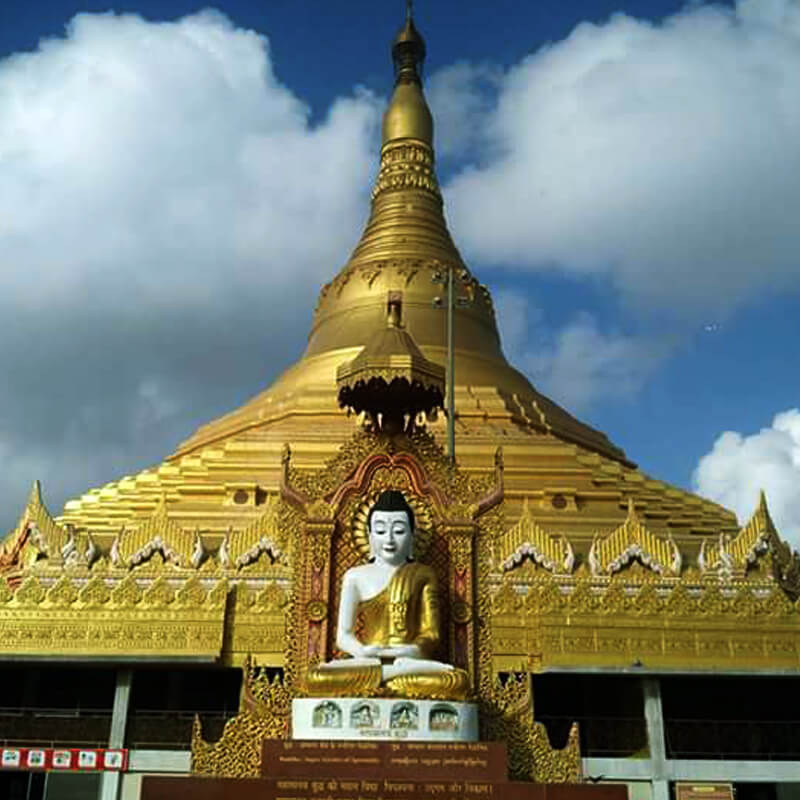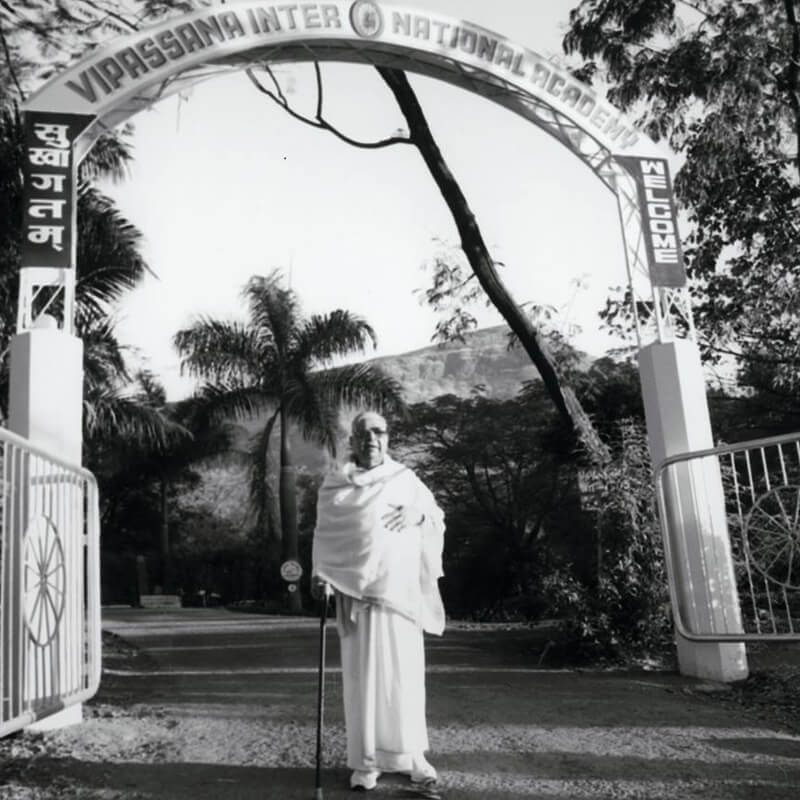Vipassana Teacher S. N. Goenka in the World Economic Forum Meet at Davos, Switzerland
S. N. Goenka, the Principal Teacher of Vipassana Meditation, was invited to participate in the Annual Meeting of the World Economic Forum held in Davos, Switzerland from 27 January to 1 February.
This is the highest level meeting of the global leaders in politics, business and media where they meet informally to discuss various issues facing the world. WEF Annual Meeting is often referred to as the summit of summits and this year's meeting had a special significance being the first such meeting in the new millennium. It was noteworthy that spirituality was added among the business affluence and the political influence of the world leaders in those fields.
Goenkaji spoke in the gathering in various sessions on "the future of religion", "death: exploring the taboo", "anger and how to deal with it" and "the meaning of true happiness".
The participants in the Annual Meeting in Davos included Prime Ministers, Presidents and kings of over forty countries including U.S.A., Germany, U.K., Switzerland, Spain, Mexico, Mozambique, Indonesia, Jordan, South Africa and Egypt. Deputy Prime Ministers, Vice-presidents and finance ministers of many more countries came. The richest and the biggest businessmen, most influential media barons, scientists and academicians were among the participants. This was the first time that the message of Vipassana was transmitted in this elite gathering.
In the world today that is largely dominated by economic concerns, what is the future of religion? This was the theme on the panel discussion on the morning of January 27. Because of his success in taking Vipassana to people from all the religious and racial backgrounds Goenkaji was requested to describe how the practice of a tradition transcends dogma and cultural elements. Richard Block, President, World Union for Progressive Judaism, Israel; Prof. Tu We Ming, Harvard University, USA; Kassis Nabeel, Minister and Coordinator General of Bethlehem 2000 project and Prof. Keith Ward, Prof. Of Divinity, University of Oxford, U.K. were on the panel with him.
In this session he emphasized that the inner core of every religion is morality, love and compassion. The outer shell of religion is rites, rituals, dogmas and philosophical beliefs. One should not condemn these but one should be careful not to confuse these with the essence of religion. Goenkaji explained how the teaching of the Buddha is non-sectarian, universal, practical and result-oriented. The teaching of Sila, that is morality is common to all the religions and acceptable to all. The teaching of Samadhi, that is concentration of the mind, and of Panna, that is purification of mind, is also universal and acceptable to all. Undue attachment to one's own beliefs and intolerance of other cultures and beliefs causes strife. If the essence of the Teaching were given all the importance nobody would find anything objectionable in it.
Goenkaji proposed the idea of a generic religion whereby the commonalties of the religions will be emphasized. In Vipassana people will find such a generic religion which will allow them to continue with their cultural traditions while teaching them to live a happy and harmonious life. This will bring an end to the violence and wars that go on in the name of religion. The audience were pleased with Goenkaji's exposition and listened attentively.
On the 27th January, in the evening, Goenkaji participated in a session over "Death: exploring the taboo". Richard Block, President, World Union for Progressive Judaism, Israel; Prof. Kathleen M. Foley, Dept. of Neurology, Memorial Sloan Kettering Cancer Center, USA and Prof. Keith Ward, Prof. Of Divinity, University of Oxford, U.K were on the panel.
Speaking about death, Goenkaji said that death is a taboo because of fear about death. He explained how a Vipassana meditator eradicates fear by exploring the reality within and dies fearlessly. He said that there were numerous examples of Vipassana meditators who die in a fully conscious and peaceful state of mind. When one experiences anicca within, the attachment to the physical and mental structure starts decreasing and so does the fear of death. A practitioner of Vipassana knows from his own direct experience that one dies and is born every moment. Later in Zurich while answering a question about birthday, he said smilingly that when you learn the truth about mind and matter, you would say "Happy birth moment to you!" instead of "Happy birthday to you!".
"What Should You Do When You Are Angry" was the topic of the evening session on the 28th January. Goenkaji was the speaker while John R. O'Neil, President, Center for Leadership Renewal, USA was the moderator. Points of Discussion were: In our time-compressed and competitive world there seem to be more and more opportunities than ever to get upset when things don't go our way. Anger can ruin relationships, professional careers and health. What should be done to eradicate anger.
Goenkaji explained, "The law of nature is such that one who generates anger is its first victim. One is bound to become miserable as one generates anger. It is quite obvious that anger arises when something undesirable has happened, when someone has created an obstacle in the fulfilment of one's desires. Even to the most powerful person in the world, undesirable things keep on happening and he or she is helpless to prevent it. Even when one knows that anger is bad and wants to get rid of it, anger continues to overpower from time to time.
To solve this problem, one has to seek a deeper reason for the anger within oneself. Simply diverting one's mind to some other activity is only a temporary solution. One must go to the root of the problem. One must learn to observe anger." He then explained how the simple technique of Vipassana, which involves equanimous observation of sensations with the understanding of their impermanent nature, helps one to come out of anger.
On Monday, the 31st of January, Goenkaji was the sole speaker in the session titled "Is This As Good As It Gets? The Meaning of Happiness". Derrick de Kerckhove, Director of the McLuhan Program in Culture and Technology at University of Toronto in Canada introduced Goenkaji.
Goenkaji said that an individual or a nation must strive for material growth and scientific advances but material prosperity can lead to true happiness only if there is a base of spirituality. He said that "Secular Spirituality" helps one to progress in the worldly affairs and still helps one realise at the experiential level that material comforts, worldly pleasures, fame and power are fragile and ephemeral and how they alone can not give lasting happiness. He explained how Vipassana is a practical way to get true happiness that is beyond superficial pleasures. The audience listened with rapt attention and later asked many questions about Vipassana.
When Vipassana meditators in Europe learned about Goenkaji's visit to Davos, they naturally wanted him to visit Vipassana centres in their respective countries. There are Vipassana centres in UK, Germany, Italy, France, Spain, Belgium and Switzerland. But due to his health and his busy schedule he could not go to these centres. He did, however, stopped in Zurich for a couple of days on his way back from Davos so that assistant teachers, trustees, Dhamma workers and meditators from different European countries could meet him.
In the morning of 2nd February, Goenkaji meditated with about 250 meditators from different parts of Europe and also managed to meet most of them. Many meditators could get clarifications on various aspects of their practice from Goenkaji.
In the evening of 2nd February, Goenkaji gave two public talks in the Congress Hall of Zurich. The first one, at 6.00 pm, was only in English and was addressed to a selected audience of about three hundred people. In this talk Goenkaji explained the practical, result-oriented and scientific nature of Vipassana. The next talk (at 7.30 pm) was open to general public. It was simultaneously translated into German language by an interpreter. The one thousand capacity hall was almost full. This is rare for a public talk in Europe where an audience of five hundred is considered quite big for a public talk. This showed that more and more people are getting attracted to Vipassana. The audience included intellectuals, businessmen and professionals. It was announced that the talk would last an hour and would be followed by questions and answers for half an hour. But such was the interest in the talk that the question-answer session lasted for an hour. During the two hours of discourse and question-answers, the audience was listening quietly and attentively savouring the nectar of Dhamma.
On the morning of the 3rd February, representatives of a local Buddhist organisation and journalists of the leading Swiss newspaper came to interview Goenkaji. They were keen to know why the discipline was so strict in the tradition in which Goenkaji teaches and how this tradition was different than some of the other traditions that claim to impart the Buddha's teaching. Goenkaji explained how he was attracted to the pure Dhamma as taught by his teacher Sayagyi U Ba Khin because of its universal and scientific nature. Though he came from a different background, he could not find any fault with it.
Most importantly, he started getting huge benefits even with the initial few steps on the path of Dhamma. He said, "I feel immense gratitude towards the country of Myanmar (Burma) which preserved the Dhamma in its pristine purity. It is the bounden duty of everybody who has received this peerless gift from Myanmar to preserve it in its pristine purity. The results of this pure teaching are seen all around the world. To keep this purity, strict discipline is very important. If the discipline is lax at the Vipassana courses, the teaching will soon become impure. If teaching becomes corrupt, it does not give optimum results and then eventually disappears."
The interviewers also wanted to know why Goenkaji dissociates himself from some of the meditators who have learned Vipassana from him and have started teaching on their own. Goenkaji replied that there were two things about which he was very careful: first was to prevent Dhamma from getting commercialised and the second was to keep the sanctity of teacher-disciple relationship in Dhamma. Goenkaji said, "Dhamma is invaluable. It gets devalued the moment one starts charging money for it. How could I associate with those who have commercialised Dhamma? A teacher of Dhamma teaches others to come out of passion. It is out of question for me to accept when a so-called Dhamma-teacher himself has sexual relations with his/her student. I can never agree to such a thing. I am very particular that a Dhamma teacher's dealings with his/her students are full of compassion and are totally devoid of passion. These are the two issues on which I can not compromise." There could be some differences in various techniques but these were the issues, according to Goenkaji, on which all those who claim to be the followers of the Buddha should never compromise.
The two days in Zurich were a further proof that the clock of Vipassana has struck in the remote corners of the world, even in places where the words of Dhamma were totally unheard of just a few decades back. Goenkaji went to Europe after a gap of almost ten years. These ten years saw a steady growth of Dhamma there. The seeds that he had carefully planted, patiently nurtured and lovingly guarded have now grown into big trees in the form of Vipassana centres in many European countries and are giving the cool shade of Dhamma to many a weary traveller. May more and more people walk on the path of Dhamma to come out of misery and to live a happy life. May all beings be happy.
Interview with Mr. S. N. Goenka after his address at World Economic Forum
In this interview, Mr. S. N. Goenka reflects his life as a businessman before going for a Vipassana meditation course and sea of change in his life after undergoing a Vipassana course.






